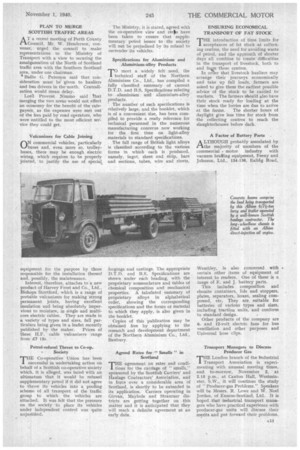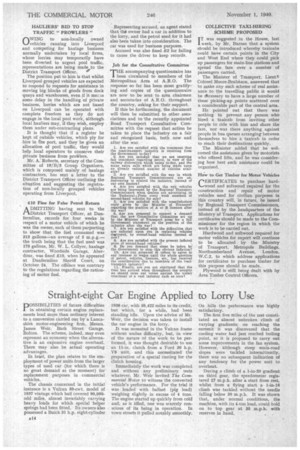PLAN TO MERGE SCOTTISH TRAFFIC AREAS
Page 15

Page 16

If you've noticed an error in this article please click here to report it so we can fix it.
AT a recent meeting of Perth County Council, Mr. W. Henderson, convener, urged the council to make representations to the Ministry of Transport with a -view to securing the amalgamation of the North of Scotland traffic area with the Southern Scotland area, under one chairman.
*Bailie G. Paterson said that consideration must be -given to hauliers and bus drivers in the`north. Centralization would mean delay.
Lora Provost Nimmo said that merging the two areas would not effect an economy for the benefit of the ratepayers, as the expenses were met out of the fees paid by road operators, who were entitled to the most efficient service they could get.
Vulcanizers for Cable Joining
(IN commercial vehicles, particularly '4a/buses and, even more so, trolleybuses, there may be enough electric wiring, which requires to be properly jointed, to justify the use of special
equipment for the purpose by those responsible for the installation thereof and, possibly, the maintenance.
Interest, therefore, attaches to a new product of Harvey Frost and Co., Ltd., Bishops Stortford, which is a range of portable vulcanizers for making strong permanent joints, having excellent insulation and being absolutely impervious to moisture, in single and multicore electric cables. They are made in a variety of types and sizes, full particulars being given in a leaflet recently published by the maker. Prices of these H.F. cable vulcanizers range from RI 15s.
Petrol-refusal Threat to Co-op. Society
THE Co-operative Union has been successful in undertaking action on behalf of a Scottish co-operative society which, it is alleged, was faced with an ultimatum that it would be refused supplementary petrol if it did not agree to throw its vehicles into a pooling scheme of all transport of the traffic group to which the vehicles are attached. It was felt that the pressure on the society to place its vehicles under independent control was quite unjustified.
The Ministry, it is stated, agreed with the co-operative view and steps have been taken to ensure that supplementary petrol issues to the society will not be prejudiced by its refusal to surrender its vehicles.
Specifications for Aluminium and Aluminium-alloy Products
TO meet a widely felt need, the technical staff of the Northern Aluminium Co., Ltd., has compiled a fully classified summary of current D.T.D. and B.S. Specifications relating to aluminium and aluminium-alloy products.
' The number of such specifications is relatively large, and the booklet, which is of a convenient size, has been compiled. to provide a ready reference for technical personnel in the numerous manufacturing concerns now working for the first time on light-alloy materials to standard specifications.
The full range of British light alloys is classified according to the various forms in which each is produced, namely, ingot, sheet and strip, bars and sections, tubes, wire and rivets,
forgings and castings. The appropriate D.T.D. and B.S. Specifications are shown under each heading, with the proprietary nomenclature and tables of chemical composition and mechanical properties. A tabulated summary of proprietary alloys in alphabetical order, showing the corresponding specifications and the forms of material to which they apply, is also given in the booklet.
Copies of this• publication may he obtained free by applying to the research and development department of the Northern Aluminium Co., Ltd., Banbury.
Agreed Rates for " Smalls " in Scotland
THE agreementon rates and conditions for the carriage of " smalls," sponsored by the Scottish Carriers' and Haulage Contractors' Association, and in force over a considerable area of Scotland, is shortly to be extended in its application. Carriers operating in Girvan, IVIaybole and Stranraer districts are getting together on this matter and it is anticipated that they will reach a definite agreement at an early date.
ENSURING ECONOMICAL TRANSPORT OF FAT STOCK THE introduction of time limits for acceptances of fat stock at collecting centres, the need for avoiding waste of petrol, and the approach Of shorter days all combine to create difficulties in the transport of livestock, both to and No these centres.
In orZer that livestock hauliers may arrange their journeys economically and take up full loads, farmers are asked to give them the earliest possible advice of the stock to be carried to markets. The farmers should also have their stock ready for loading at the time when the lorries are due to arrive at the farms. The shorter hours of daylight give less time for stock from the collecting centres to reach the slaughterhouses before dark, A Factor of Battery Parts
ALTHOUGH probably associated by the majority of members of the commercial -• motor industry with vacuum braking equipment, Feeny and Johnson, Ltd., 134-136, Ealifig Road,
Wembley, is also concerned with certain other items of equipment of interest to readers. One of these is a range of F. and J. battery parts.
This includes composition and ebonite containers, lids and stoppers, plates, separators, boxes, sealing compound, etc. They are, suitable for batteries of various types and sizes, including traction units, and conform to standard design.
Other products of the company are 6and 12-volt electric fans for bus ventilation and other purposes and Universal hose clips.
Transport Managers to Discuss Producer Gas
THE London branch of the industrial Transport Association is experimenting with unusual meeting times, and to-morrow, November 2, at 2.15 p.m., at Caxton Hall, Westminster, S.W.., it will continue the study of "Producer-gas Problems." Speakers will be Messrs. R. Lowe and W. Noel Jordan, of Enness-Sentinel, Ltd. It is hoped that industrial transport managers who have practical experience with producer-gas units will discuss their merits and put forward their problems.
HAULIERS' BID TO STOP TRAFFIC " PROWLERS "
OWING to non-locally owned .vehicles running into Liverpool and competing for haulage business normally undertaken by local firms, whose lorries may temporarily have been diverted to urgent pool traffic, representations are being made to the District Transport Officer, The position put to him is that whilst Liverpool grouped vehicles are expected to respond to requests for assistance in moving big blocks of goods from dock quays and warehouses, even if it me-,:as some delay in the handling of private business, lorries which are not based on Liverpool can be operated with complete freedom as they do not engage in the local pool work, although, local hauliers may, if they wish, employ them under sub-contracting plans.
It is thought that if a register be kept of outside vehicles, which ply for hire in he port, and they be given an allocation of pool traffic, they would help local operators to conserve their private business from prowlers, Mr. A' Roberts, secretary of the Committee of 10/B/3 Group Organizers, which is composed mainly of haulage contractors, has sent a letter to the District Transport Officer outlining the situation and suggesting the registration of non-locally grouped vehicles operating from Liverpool.
• LW Fine for False Petrol. Return
A DMITTING having sent to the i-S.District Transport Officer, at Dunferniline, records for four weeks in respect of a motor vehicle of which he was the owner, each of them purporting to show that the fuel consumed was 313 gallons—an average of 5 mpg.— the truth being that the fuel used was 179 gallons, Mr, W. L. Collyer, haulage contractor, Woodside Garage, -Aberdour, was fined £10, when he appeared at Dunfermline Sheriff Court, on October 24. The offence was contrary to the regulations regarding the rationing of motor fuel.
Representing accused, an agent stated that the owner had a car in addition to the lorry, and the petrol used for it had also been taken into consideration. The car was used for business purposes.
Accused was also fined £2 for failing to cause the driver to keep records, Job for the Consultative Committee
THE accompanying questionnaire has been circulated to members of the Metropolitan Area of A.R.O. The response so far has been most gratifying and -copies of the questionnaire are now to be sent to area chairmen and secretaries of A.R.O. throughout the country, asking for their support.
If this be forthcoming, the document will then be submitted to other, associations and to the recently appointed Road Transport Consultative Committee with the request that action be taken to place the industry on a fair and recognized basis, both now and after the war. • COLLECTIVE TAXI-HIRING' SCHEME PROPOSED TT was suggested in the House, last week, by Mr. Barnes that a system should be introduced whereby taxicabs could have certain points in the City and West End where they could pick up passengers for main-line stations and spread the fare over a number of passengers carried.
The Minister of Transport, Lieut.' Colonel Moore-Brabaion, answered that to make any such scheme of real assistance to the travelling public it would be rfecessary to have a large number of these picking-up points scattered over a considerable part of the central area.
He pointed out that there was nothing to prevent any person who hired a taxicab front inviting other people to ride with him and share the fare, nor was there anything against people in bus queues arramging-between themselvea to hire a taxicab in order to reach their destinations quickly.
The Minister added that he welcomed the assistance given by motorists who offered lifts, and he was considering how best such assistance could be organized.
• How to Get Timber for Motor Vehicles
CERT1FICATES to purchase hard1.-..wood and softwood required for the construction and repair of motor vehicles used for civilian purposes in this country will, in future, be issued by Regional Transport Commissioners. instead of by the headquarters of the Ministry of Transport. Applications for certificates should be made to the Commissioner for the region in which the work is to be carried out.
Hardwood and softwood required for motor vehicles for export will continue to be allocated by the Ministry of Transport, Metropole Buildings, Northumberland Avenue, London, W.C.2, to which address applications for certificates to purchase timber for this purpose should be made.
Plywood is still being dealt with by Area Timber Control Officers.




















































